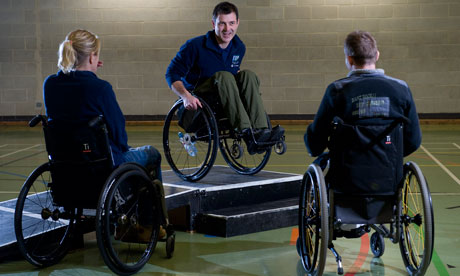
In 2005 while working as a tree surgeon, I fell from a tree, broke my back and suffered a spinal cord injury. I spent three and a half months in hospital learning to live with paraplegia. When I was discharged, I claimed incapacity benefit. This significant contribution to our household income proved invaluable at a time in my life when all of my waking hours were taken up with managing the day-to-day practicalities of living with spinal cord injury. When I first returned home, getting up and dressed often took about three hours.
During the first year, I couldn’t imagine ever working again. As my wife was five months pregnant when I had my accident, I concentrated much of my energy on being a father to our new baby. This I found intimidating and frustrating enough. The idea that I would ever be able to contribute to our family finances seemed extremely unlikely.
Things changed over time. About two years after my accident, I started writing an account of my experience. What began as pure catharsis eventually presented an opportunity to embark upon a new career.
The decision to cease claiming incapacity benefit was a hard one to make, as the financial case was far from convincing. My writing eventually became a memoir, Looking Up, which was published in 2008. On the strength of the book I began writing a column for a national newspaper, as well as features elsewhere.
Freelancing in a very competitive industry makes income unpredictable. The chronic neuropathic pain caused by the nerve damage in my back is unpredictable too. On a bad day, I can barely get up and dressed, let alone be productive.
I did come off incapacity benefit, and while my financial situation hasn’t changed significantly, I feel it was the right decision for me. I have worked all my adult life, and the emotional rewards from doing something creative are certainly good for my head. The career of a freelance writer is unusual in offering enough flexibility to be able to work around the unpredictability of managing a chronic pain condition, and the inevitable slow starts. On nights when I can’t sleep I can write, although the quality of the output is rather unpredictable. (This I put down to my medication. For my daytime work I have fewer excuses.)
Not everyone on incapacity benefit is in the same position. Few part-time jobs pay anywhere near enough to make the switch financially prudent, let alone offer such flexibility. In a time of retrenchment and cuts in services, job security is at rock bottom. Disabled people are more likely to be unemployed even in economic boom times. For anyone who is on the margins between limited work and incapacity, coming off benefits could be described as risky at best.
I like to think that, in the event of my pain worsening or my mobility deteriorating, it would be possible to convince the relevant authorities that I should be entitled to claim benefits again. But things have changed. Incapacity benefit has been replaced with employment and support allowance.
Stories abound of people being bullied by assessors who clearly have a “pass curve” approach where the aim is to get a certain percentage of people off benefits rather than taking each case on individual merit. In the land of the blind, the one-eyed man is no longer considered to have a visual impairment.
The introduction of a household income means test would also put my previous successful claim in doubt.
After my accident, relatives from overseas were impressed with the level of care and support I received from the NHS and from the welfare state. I am certain that this is what enabled me to develop the confidence to rebuild my future. Had I suffered the same accident seven years later, I fear my future would be less certain.
![]()
guardian.co.uk © Guardian News & Media Limited 2010
Published via the Guardian News Feed plugin for WordPress.

Both my partner and I had terrible mental breakdowns. My partner has even worked for thirty years, paying tax & NI. Without it we would have been homeless and ultimately done for long ago. And we wouldn’t be so lucky now…